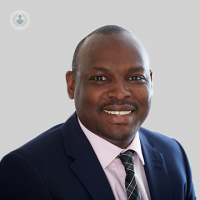Management of fertility in a one-stop assessment clinic
Written in association with:Difficulty conceiving affects one in six couples in the UK. Couples who do not conceive within six to twelve months of regular unprotected intercourse often, understandably, feel distressed and anxious about the possible causes of infertility. Here, fertility expert and consultant obstetrician & gynaecologist Mr David Ogutu, explains how he helps couples investigate their fertility problems at his specialised clinic, the Herts and Essex Fertility Centre.

Who is affected by infertility and how common is it?
Appropriate investigation usually shows that 3 in 10 couples have no fertility problems and up to 40% of couples with normal investigation results conceive spontaneously in the 6 to 12 months following investigation.
In other cases, 3 in 10 will have a male factor and 3 in 10 a female factor responsible for their difficulties conceiving. In some cases, male as well as female factors are identified.
Appropriate investigations and fertility advice in a timely, discrete and sensitive process is of the utmost importance to couples. However, with increasing pressures on the NHS, many couples are faced with long waits for strung out investigations which in some cases could take up to 18 months to complete. For a stressed couple anxious to get the tests done and results interpreted in order for a management plan to be formulated, the pathways and resources available in primary care and in most hospitals are not acceptable in the eyes of many couples.
When is fertility testing appropriate?
The National Institute of Clinical Excellence (NICE) recommendations for the investigation of couples with difficulties conceiving advise that tests should be instituted if one has not conceived despite 12 months of regular unprotected intercourse.
At Herts and Essex Fertility Centre, we provide an easy, reliable and fast one-stop fertility assessment service. Couples do not need a GP referral for the investigations. Tests that would normally take up to 18 months over up to six appointments are performed by fertility experts in just two visits over a two week period.
What tests are taken and how are they performed?
The first visit can take place at any time in the cycle. It takes less than an hour and is with a fertility nurse specialist. A seminal fluid analysis is performed and the results are available within 30 minutes of providing the sample. Blood tests are performed to check the female egg reserve (AMH) as well as immunity to Rubella and a full blood count to assess general well- being. A urine specimen is examined for Chlamydia and gonorrhoea infection.
The second visit one to two weeks later will last one hour. This will be with a consultant fertility specialist. It will include a 3D saline infusion sonogram (SIS) and Hystero–Contrast –Sonography procedure.
- 3D ultrasound scan will assess the uterus and ovaries. Congenital uterine abnormalities will be checked for. An antral follicle count would determine the egg reserve. Ovarian cysts if present will be assessed.
- Saline infusion sonogram will assess the endometrium for polyps, fibroids and scar tissue that may affect implantation or cause miscarriages.
- HyCoSy procedure at the same time will assess the fallopian tubes for patency
The procedure lasts 20-30 minutes and all the results are available at the end of procedure. The 3D / SIS / HyCoSy, semen analysis as well as blood test reports will be discussed with the expert to include the recommended treatment plan.
A detailed report will be sent to you to share with your GP or NHS fertility clinic, saving months of waiting.



